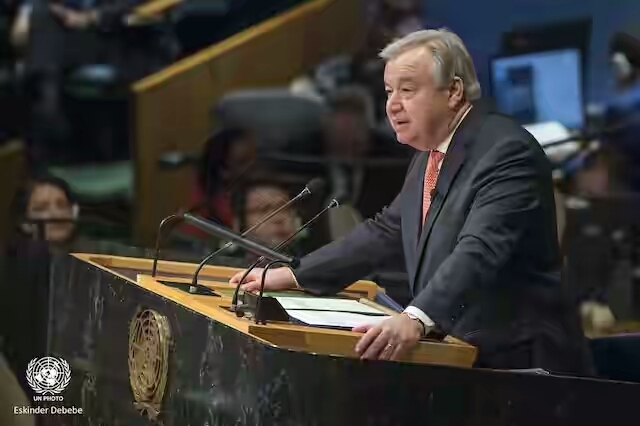Disregard for human rights is a “disease”, the UN Secretary-General António Guterres asserted on Monday, urging Member States to uphold the rights of all people in the face of rising populism and extremism.
Guterres, in his remarks at the opening session of the 34th regular session of UN Human Rights Council, appealed to world governments to speak up for human rights in an “impartial way”.
“Disregard for human rights is a disease, and it is a disease that is spreading – North, South, East and West.
“The Human Rights Council must be part of the cure,” the Secretary-General challenged the UN rights body.
He said he had lived under the dictatorship of Portugal’s António de Oliveira Salazar, and knew democracy only at the age of 24.
“Denying his compatriots their human rights had oppressed and impoverished many of them, resulting in a mass exodus, and also brought bloody civil wars to Portugal’s former colonies in Africa,” Guterres regretted.
He highlighted the importance of the Universal Declaration of Human Rights and the treaties that derived from it, and urged the Council to be “fully engaged” on the issues that require their attention.
“We are increasingly seeing the perverse phenomenon of populism and extremism feeding off each other in a frenzy of growing racism, xenophobia, anti-Semitism, anti-Muslim hatred and other forms of intolerance.
“Minorities, indigenous communities and others face discrimination and abuse across the world.”
Among other issues, Guterres also called for the protection of the human rights defenders and journalists who are “essential” to the checks and balances of any society.
In his address, UN High Commissioner for Human Rights, Zeid Al Hussein, denounced “reckless political profiteers” who threaten the multilateral system or intend to withdraw from parts of it.
“We have much to lose, so much to protect. Without a commitment to fundamental human rights, to the dignity and worth of the human person and to the equal rights of men and women and of nations large and small, our world will become chaos, misery and warfare.
“Of all the great post-war achievements, it is this assertion of the universality of rights in human rights law that may be the most noteworthy,” Zeid warned.
The UN rights chief, particularly, challenged the political actors, saying “the sirens of historical experience ought to ring clear” and pledged that “we will not sit idly by” in the face of violations.
“Our rights, the rights of others, the very future of our planet cannot, must not be thrown aside by these reckless political profiteers,” he added.
The President of the 71st Session of the UN General Assembly, Peter Thomson, called for greater dialogue and cooperation for peace among Governments, the UN system, civil society and the private sector. (NAN)

